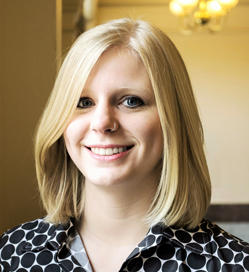
Janna Moen
PhD Thesis Title:
Current Position:
Postdoctoral Fellow, Yale
Past Position(s):
Postdoctoral Fellow, Icahn School Of Medicine At Mount Sinai
Undergraduate Institution and Major:
Saint Anselm College, B.A. Biology, 2014
Graduate Advisor:
Anna Lee, Ph.D., Department of Pharmacology
Description of Graduate Research:
Graduate Publications:
- Sex differences in the nicotinic acetylcholine receptor system of rodents: Impacts on nicotine and alcohol reward behaviors. Front Neurosci. 2021 Sep 21;15:745783.
- Bidirectional sex-dependent regulation of α6 and β3 nicotinic acetylcholine receptors by protein kinase Cε. Addict Biol. 2021 May;26(3):e12954.
- Touchette JC, Moen JK, Robinson JM, Lee AM. Enhancement of alcohol aversion by the nicotinic acetylcholine receptor drug sazetidine-A. Addict Biol. 2020 Apr 24:e12908.
- DeBaker MC, Moen JK, Robinson JM, Wickman K, Lee AM. Unequal interactions between alcohol and nicotine co-consumption: suppression and enhancement of concurrent drug intake. Psychopharmacology (Berl). 2020 Apr;237(4):967-978.
- DeBaker MC, Robinson JM, Moen JK, Wickman K, Lee AM. Differential patterns of alcohol and nicotine intake: Combined alcohol and nicotine binge consumption behaviors in mice. Alcohol. 2019;85:57-64.
Graduate Abstracts:
- Cell-Specific Targeting of Individual Nicotinic Acetylcholine Receptor Subunits in Alcohol and Nicotine Reward. Poster presented at Society for Neuroscience Annual Meeting; San Diego, CA. Program No. 159.04, November 2018.
- Targeting Individual Nicotinic Acetylcholine Receptor Subunits in Alcohol Reward Circuits. Poster presented at Research Society on Alcoholism Annual Meeting; San Diego, CA. Alcoholism: Clinical and Experimental Research 42 (6), June 2018.
Graduate Level Awards and Honors:
- COGS Travel Award 2019
- Research Society on Alcoholism NIAAA Conference Student Merit Award 2019
- Stark Advanced Scholarship Travel Award for a Specialty Conference, 2018
- F31 Individual NRSA Predoctoral Training Grant F31AA026782, 2018-present
- National Institute on Drug Abuse Predoctoral Training Grant, 2017
- 3M Science and Technology Fellowship, 2015
GPN Committees:
- Steering Committee, 2019-2021
- Mentorship Committee, 2017-current
- Admissions Committee, Student Representative, 2017-current
Other Committee Involvement:
- Basic Graduate Student Council, 2018 - present
- Graduate Student Benefits Committee, 2017
Professional Outreach:
- Brain Awareness Week
- Minnehaha Academy, Minneapolis, MN (November 2016)
- Jefferson High School, Alexandria, MN (December 2016)
- Minnesota Academy of Sciences: Science Bowl, St. Paul, MN
- Middle school score keeper (January 2016)
Professional Memberships:
- Society for Neuroscience, 2018-current
- Research Society on Alcoholism, 2018-current
Thesis Committee Members:
- Marija Cvetanovic, PhD, Department of Neuroscience (chair)
- Anna Lee, PhD, Department of Pharmacology (advisor)
- Kevin D. Wickman, PhD, Department of Pharmacology
- Patrick Rothwell, PhD, Department of Neuroscience
Research Categories:
- Neuroscience of Drug Abuse & Addiction
- Neurogenetics
- Behavioral & Cognitive Neuroscience
Rotations:
- Kevin Wickman, Ph.D., Department of Pharmacology
- Stan Thayer, Ph.D., Department of Pharmacology
- Lorene Lanier, Ph.D., Department of Neuroscience
What Got You Interested In Research?
I've always loved science and medicine, and for a long time I wanted to be a clinician. Once I went to college, I realized my true passion was the science behind medical advancements, and I completed a full-time summer internship to see what a career in research might be like. I absolutely loved it and decided that graduate school, and a career in biomedical research, was the right fit for me.
Why Did You Choose MN?
I chose UMN for several reasons, the first and foremost being the very clear dedication the program has to the education and well-being of their students. It is a nationally ranked program with faculty members that are heavily invested in their students. I wanted a school that cared my scientific achievements as well as my professional development. The graduate students were also a cohesive and welcoming body, and it was comforting to know they would be a great resource for us not only for academic advice but personal advice as well. The course-heavy nature of the first year of this program was also a considerable factor, as I had no neuroscience experience coming into my first year and needed a strong foundation in the subject before beginning my PhD thesis work. Finally, Itasca was the perfect opportunity to learn about neuroscience while getting to know my classmates in a low-stress environment.
What Advice Would You Give a First Year Graduate Student?
Study hard, but give yourself time to relax and have fun. Your brain will thank you!
